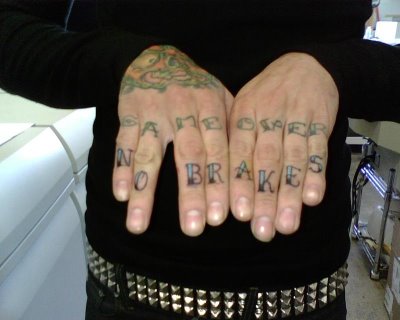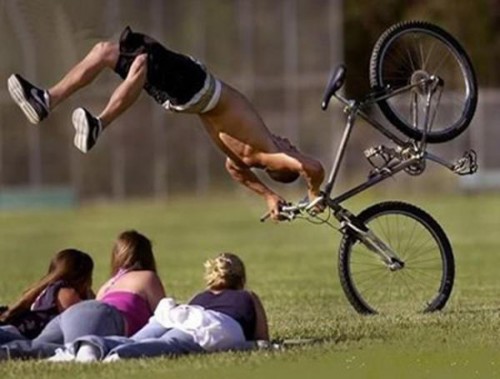Saturday, in the NRC race at St. Louis, Brad Huff, right before the first corner, yelled one of his funny, yet pertinent lines. “Now boys, we’ll see who has aluminum and who has carbon.” He likes to break the ice that way, a lot of times, but it got me thinking how bad braking on our race bikes is now compared to before.
I think it is a two fold deal. First, the brakes don’t seem to have as much power as they used to. I think I first noticed this when Shimano went from 8 speed to 9 speed. The brake calipers themselves shed a ton of weight, but the squishiness of the calipers was super apparent. The arms themselves flexed a ton. When I went to Redlands that first year, I put my front 8-sp caliper back on and it worked so much better. I think I left that caliper on for two or three years.
But, the carbon rims have changed the game dramatically, for the worse. Breaking on carbon pretty much sucks. It is very unpredictable. It really depends on the speed that you are going, the temperature, the brake pads you are using, a lot of things. When aluminum was the rim choice, I don’t hardly ever remember going into a tight corner “hot” and mildly panicking because I wasn’t stopping fast enough. Now it seems to be the norm for a lot of the field.
On Saturday, I couldn’t believe how early before the corners that good riders were applying their brakes. I think it must have been to get the water off the rims and get a feel for how much braking they were going to have. I don’t know, but it really threw off my cornering rhythm.
Watching the Tour on television, I am amazed how many guys are falling on descents, in the corners. I have to blame a lot of that on the braking, or lack braking. Carbon rims are so unpredictable. They heat up the pads and sometimes catch when you least expect it.
Riders aren’t going to give up the weight gains of riding carbon for the addition safety of better braking. That isn’t going to happen. So, I’m not sure how to alleviate the issue. Maybe the riders themselves can try to pick better brake pads for the conditions, so they have the optimal braking power. I normally use SwissStop yellow pads most of the time. They work on both aluminum and carbon rims. I hate changing my pads back and forth, so it is a good choice.
I wish the bicycle manufactures would realize the problem here and come up with a solution. More brake pad selection, beefier brakes, something. Because this lack of ability to stop has really made the sport much more dangerous.







disc brakes on the road… it is a conspiracy man the rim manufactures want to make all rim brakes obselete so we can’t use the old stuff. component makers want to force everyone to get new brake levers… frame folks want to see you new disc compatible frames man…
“it’s a conspiracy man”
that or just piss poor product development.
I’d be all about some road hydraulic disc brakes. I spent the weekend doing lots of super-hilly rainy riding in Ohio and my bike was black with rim/pad residue. I hate the sound of my rims grinding away as I slow to a stop after a ride in bad conditions.
Yeah, hydro road discs would weigh more and so would the forks and frames needed to accomodate the systems, but bike tech has gotten to the point that a disc road bike would still be under the UCI limit.
Plus, with all the riding I do on gravel and dirt roads, I’d prefer having better braking.
One last point: why is it so hard to find a CF road bike with fender mounts? Stupid.
I like the cork pads for carbon rims as long as it’s dry. They’re more progressive and don’t “catch” when they heat up. You don’t want them if it’s wet. There’s still nothing better than regular black rubber compound pads on aluminum rims, especially when it comes to cross. It’s usually, at least moist, in cross races and the ability to brake late can be race changing.
A road frame set up for fenders and disc brakes is a good idea for long dirt road rides and randoeauring, but I hope we never see that in road races.
Nah, you don’t race with fenders, but if you have only one bike to race and train on, the capability to run full fenders would be awfully nice.
Or, I guess they already make those – they’re called CX bikes. :-/
Disc brakes on road bikes–it’s the future. They’re already UCI cross legal (increasing acceptability, though in a different arena) and pro bikes are light enough to accommodate the extra weight (12 lb. bikes aren’t hard to build, just expensive). Add this with gravel-specific bikes outfitted with cable disc and I would have to surmise that road disc are on the horizon.
Or you can look at it this way: cable-pull shifters and brakes are the most antiquated aspects left on advanced bicycles. Electronic shifters have entered the market, leaving cable-pull brakes alone.
It may not be ready for next season, but it won’t be too much longer.
It is a joke that companies continue to offer lighter and lighter road brakes. They shave 100g off your rig, but are unable to actually slow it down.
Any crits that require technical braking, my carbon wheels stay in the pit and at minimum I slap on an aluminum wheel on the front.
Incorporate a thin aluminum strip on the rim into the carbon to provide a braking surface, make the strip 1/2 mm. thick, whatever the width of the brake pad is, wide.
Good topic and good feedback here. As a quick upgrade, replacing the traditional wound housing with the “braided” or “woven” housings. This stuff significantly reduces flex, the “mush” we all feel, which is mostly in the housing. Squeeze the lever hard and watch the housing squirm about. The carbon surfaces don’t help any as ST states. More could be done certainly.
Calvin,
Any brand recommendations for the “braided” or “woven” housing?
Thanks.
And thanks for literally walking (or shuffling actually) the young Colorado College bikers through rotating pacelines in the living room of the Cycling Theme House at 321 E. Monument in the Springs circa 1987.
You guys need to get back to basics – regular aluminum rims – the non-aero type rims – because it’s all a mental game in your minds created by Madison Avenue (advertising or pro cyclists).
Ted, Do you mean these guys?http://oyvelo.com/yahoo_site_admin/assets/images/madison_sling.198183402_std.jpg
Because they have cool aero carbon stuff and no brakes at all!
Jagwire(R) ripcord housing or similar is good. The entire game is to transfer the leveraged power of your hand to the pad shoving at the rim/disk. Road wheels are nothing more than a huge rotor. A brake before its time is the Magura rim hydraulic brake. The STI systems put that out the running. Road disc’s have potential, and the rims could be even more ridiculously lighter withot the need for a breakable shapes. I fear no wheel change, but I will admit here rotors at the hub give me the willies. Lightening fast changes are not what you see at the MTB Tech pits. Count your fingers after each one.
Steve I agree, I remember the Iowa State Championship Crit in about the mid 90’s in Adel(mostly bricks) It was pouring down rain and we were in a small group together that rolled away. You were riding the front and most of the local guys wouldnt take a pull, which was probably safer.
Anyway this guy comes into a corner between you and me and at first i thought “good someone else is gonna take a turn”
then i thought”he must be a good bike handler he is really moving”
my final thought was “he is squeezing the life out of his brakes”
just then the brakes bit hard making him swap ends and he went over the bars on top of me, bent my steel frame and tacoed my rear wheel where he landed on it.
they should give classes on how to brake in the rain,